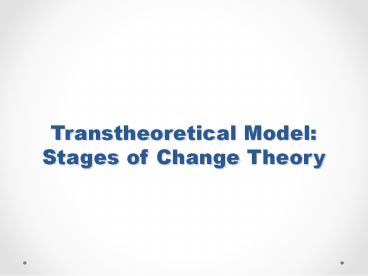Transtheoretical Model - PowerPoint PPT Presentation
1 / 18
Title:
Transtheoretical Model
Description:
Transtheoretical Model Stages of Change Theory * * * * * Change Theory Changing behavior is difficult Examples? Change Theory Typical influences used to promote ... – PowerPoint PPT presentation
Number of Views:876
Avg rating:3.0/5.0
Title: Transtheoretical Model
1
Transtheoretical Model
- Stages of Change Theory
2
Change Theory
- Changing behavior is difficult
- Examples?
3
Change Theory
- Typical influences used to promote health
- Social (peer pressure, policy changes)
- Biological (nicotine replacement)
- In Stages of Change Theory, influence occurs from
within - Behavior modification occurs in stages, over time
- These stages describe an individuals attitude
toward the change
4
Stage One Precontemplation
- Represents those individuals who have no desire
to change behaviors in immediate future - Some in this stage are unaware of behavior
- Some aware of behavior consequences but continue
anyway - Rationalizing makes sense
- Previous failures at behavior modification
5
Precontemplation The Four Rs
- Reluctance
- Not fully conscious of behaviors impact
- Rebellion
- May be due to prolonged fears
- Adolescence
- Resignation
- Lack of energy to change
- Rationalization
- Excuses
6
Stage Two Contemplation
- Intent to change behavior within six months
- Six-month term based upon behavior modification
research - Individual is aware of the desired behavior
- Benefits
- Barriers (finances, time, support)
- Change planned based on interpretation of
benefits and barriers
7
Moving from Precontemplation to Stage 2
- How?
- Improve Awareness of behavior
- Mass media
- Education
- Easily attainable goals to ensure success
8
Stage Three Preparation
- Serious consideration of behavior change within
30 days - Previous attempts to change (smoking cessation
for a week, e.g.) - Here, the individual is most ready for change
9
Movement from Contemplation to Stage 3
- No rushing
- Individual should be allowed to take his/her time
- Encouragement
- Education
- Motivational techniques
10
Stage Four Action
- A distinct change in behavior occurs
- Change is consistent
- Visible
- Receives the most recognition
- Requires the greatest commitment
- Relapse common in this stage
11
Movement from Preparation to Stage 4
- General goal(s), objective(s) in place
- Praising individual for readiness
- Enlisting support
- Environment may need to be manipulated
- Turning off television during prime time to
promote studying, e.g.
12
Stage Five Maintenance
- Should be at least six months after the behavior
change, may last for years - The changed behavior will dictate amount of time
needed in this stage - Major changes will probably require more time
- Minor changes will probably require less time
- Individuals self-efficacy is highest at this
stage
13
Movement from Action to Stage 5
- Time required for adaptation to behavior
- Specific guidelines/routines are followed e.g.
reading class notes every MWF 8-10 p.m. - Continued support, positive reinforcement
- Pros of behavior change need to outweigh the
cons
14
Stage Six Termination
- Behavior change has been permanently adopted
- 100 self-efficacy
- No temptation to relapse
- Often, a more realistic goal is permanent
maintenance - Termination difficult to achieve
15
Movement from Maintenance to Stage 6
- Relapse preparation
- Individual anticipates temptation for relapse
- Individual creates ways to cope with relapse
- Relapse may extend more than one stage
16
Can You Identify the Stage?
- Steve wants to meet more people, so he enrolls in
a travel class. Class begins next week - Natty began an exercise program three months ago
and continues to attend
17
Can You Identify the Stage?
- Tatiana is told by her family she consumes too
much alcohol, but she doesnt feel there is a
problem - Mark wants to reduce his negative stress. He
investigates possible therapists through his
insurance company and has begun to research
stress on the internet.
18
Stage Model Applied to You
- Changes you acknowledge you need/want
- Changes you are undergoing
- Changes you have made
- Changes you do not yet know about
















![[PDF] Group Treatment for Substance Abuse: A Stages-of-Change Therapy Manual Second Edition Kindle PowerPoint PPT Presentation](https://s3.amazonaws.com/images.powershow.com/10079421.th0.jpg?_=202407160912)














